|
|
| |
|
 We do news right, not fast
We do news right, not fast
Note: This blog expresses only the opinions of the blog owner,
and does not represent the opinion of any organization or blog
that is associated with The Golden Rock.
|
|
Archive for the ‘review’ Category
Wednesday, January 9th, 2013
(Below are thoughts on the film that I wrote down just hours after seeing the film for the first time with only Chinese subtitles and without considering the complex philosophies behind the film. For a more detailed and thoughtful take on the film, I would recommend Kozo’s upcoming review on LoveHKFilm.com and Maggie Lee’s review on Variety)
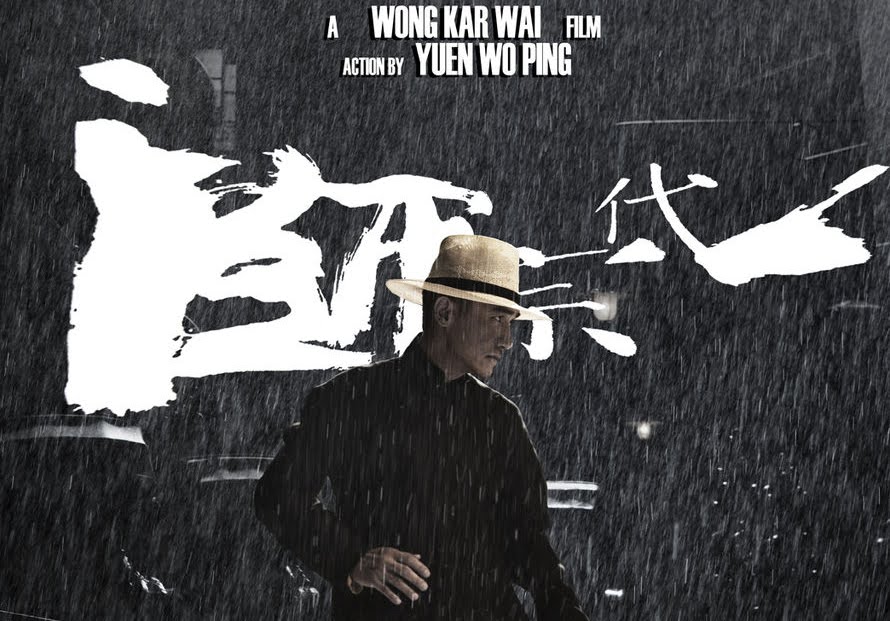
For a while, Wong Kar-wai’s THE GRANDMASTER had an “s” at the end of the title, and it’s easy to see why from the final product. Originally envisioned as the biography of Ip Man - the Wing Chun master best known as Bruce Lee’s master - THE GRANDMASTER is and isn’t the story of Ip Man. Ip is simply one of the major players in Wong’s epic about “Wu Lin”, or what one may call the martial arts world. The story covers part of Ip’s life from 1936 to 1960 (his death is also expressed in intertitles), but its scope is far wider than just one man’s life. This is the closest thing I’ve ever seen to a contemporary wuxia film, and it is indeed every bit as arty AND as exhilarating as anyone can expect from a (real) wuxia film by Wong Kar Wai.
In ASHES OF TIME, Wong used the world of Jin Rong’s wuxia novels to examine themes like longings, regrets and unrequited love, going to the lengths of even taking out action scenes when he revisited it for the REDUX version. While THE GRANDMASTER visits such themes once again, they are not the focus in what is first and foremost a film about the “Wu Lin” world. Specifically, it’s about the different philosophies and traditions held by the schools that occupy it. In one breathtaking sequence, the masters of several northern style martial arts each spar with Ip Man (Tony Leung) to show him how to take on Gong Bao Shen, the retiring chairman of the Chinese Martial Artists Union in Foshan. With this sequence, not only does Tony Leung show how well he has acquaint himself with the style of Wing Chun, Wong Kar Wai also shows off his (and his collaborators - including martial arts scholar Xu Haofeng) dedication in faithfully depicting the various forms of martial arts in his film.
THE GRANDMASTER is indeed about Ip Man’s road to become the last one standing, but Wong never indulges in the glamorous myth-making that Tsui Hark did with Wong Fei Hung in ONCE UPON A TIME IN CHINA or Wilson Yip did with his IP MAN films. Ip Man here is not unlike the Chow Mo Wen character in IN THE MOOD FOR LOVE and 2046 - introverted, contemplative, cool in the face of any situation, and a man who finds himself caught in circumstances beyond his control. As a result, Ip Man isn’t a particularly interesting character if not for his skills in Wing Chun.
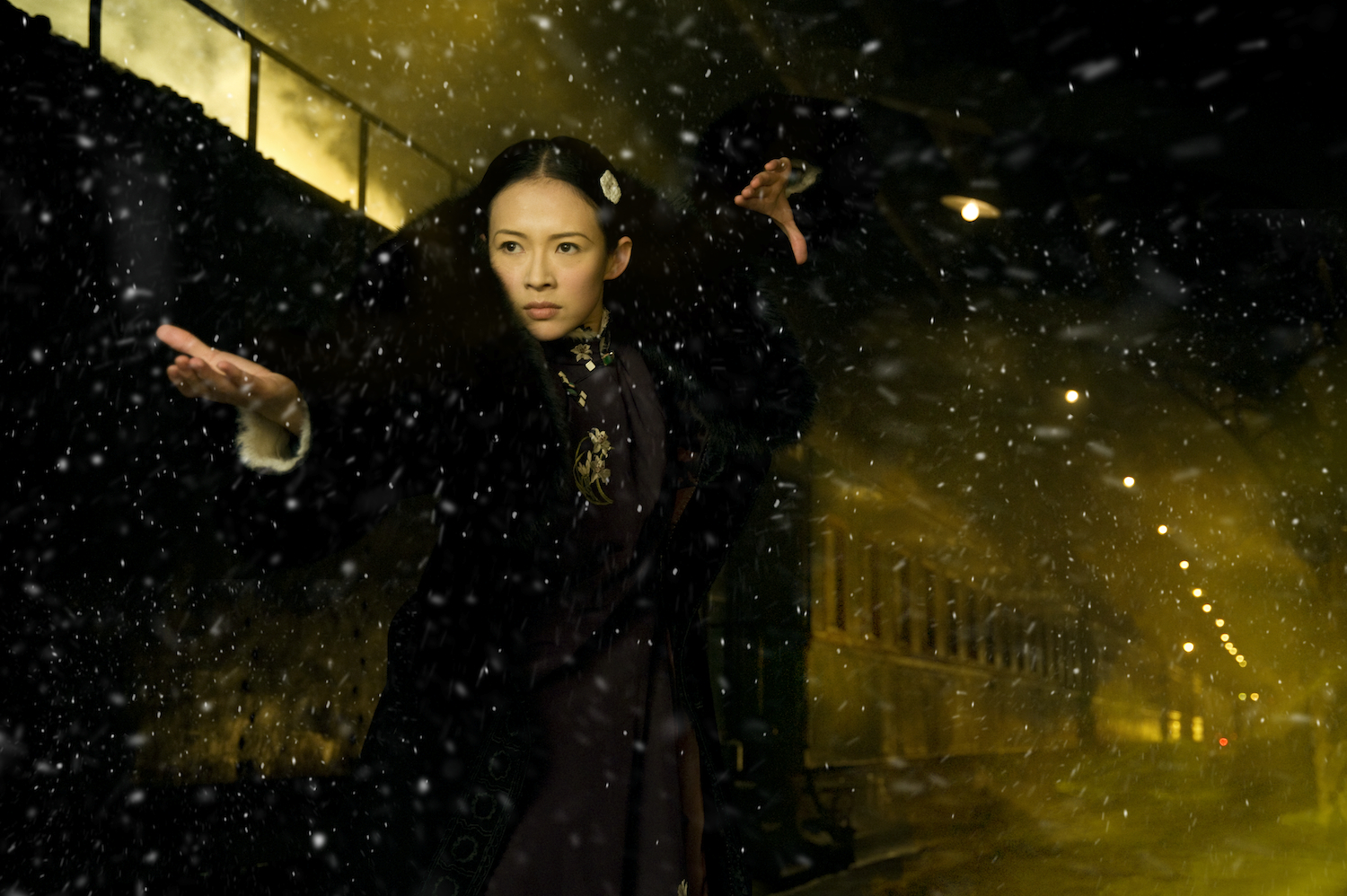
Instead, THE GRANDMASTER will be remembered for Zhang Ziyi, who plays Ip’s rival Gong Er, also Gong Bao Shen’s daughter and the heir to her family’s 64 Stance move. A strong-willed female martial artist out to reclaim her family honor despite her father’s rejection, Gong Er is such a strong character (thanks to Zhang Ziyi’s performance) that her story alone could’ve easily been made into a separate film. Wong has always been great at creating strong female characters, and Gong Er is definitely one of the best he has ever written.
At the same time, that shift in focus is ultimately THE GRANDMASTER’s major weakness. From the parallel narratives and Chang Chen’s brief, but memorable appearances, one can tell that Wong was trying to make a film that shows the contrast in the philosophies of the three masters/martial art styles: Leung’s Ip Man (Wing Chun), Zhang’s Gong Er (Baqua Quan), and Chang Chen’s Yi Tian Xian (Baji Quan). Each of the narrative would’ve been strong enough to become an individual film, but the film feels loose and not cohesive enough when put together in its current truncated form. There are parts of the film that are simply gorgeous and/or breathtaking, but those parts are ultimately greater on their own than the film as a whole.
An even bigger weakness? Chang Chen only shows up in three scenes that have no bearing on the two main stories. Yet, he is so good here (especially in his bloody fight scene in the rain towards the end of the second act) that you may wish the film is half an hour longer just so WKW could fit him in.
As a result, THE GRANDMASTER isn’t a film that will send anyone out of the cinema fired up. There’s no Bruce Lee or teeth-grinding foreign villains here to excite anyone. It’s a film about lamenting a bygone era, the price of pride and honor, and - being a Wong Kar Wai film - it also becomes a film about longings, regrets, and unrequited feelings. It is a beautiful art film a la Wong Kar Wai, but it is also a great martial arts film as well, though not in the traditional shallow way. Each of Yuen Wo-Ping’s moves is as intricately calculated and breathtaking as Wong Kar Wai and cinematographer Philippe Le Sourd’s shots, but the choreography is simply part of what Wong and his co-writers are trying to express. THE GRANDMASTER is a martial arts film on both a physical and a spiritual level; a true examination of “Wu Lin” and how martial styles apply to life instead of just simple action escapism that most martial arts film fans would usually look for. In other words, as long as Wilson Yip sticks to his usual formula for IP MAN 3, he has nothing to worry about.
Despite what seems to be a muted praise, THE GRANDMASTER is still an excellent film – the technical aspects are top-notch, the actors are excellent (especially in their fight scenes), the dialogue are as quotable as ever, and its philosophical approach to martial arts will be appreciated by many wuxia fans. It also suffers from usual WKW weaknesses – the storytelling can be muddled at times, and most of the characters simply embody ideas rather than becoming real characters (Think Chang Chen or Song Hye Kyo, who has only one line and 5 minutes of screen time as Ip’s wife). It’s not a ground-breaking film in the genre, but it’s refreshing as a film that recognizes martial arts as a way of life rather than a nationalism tool. THE GRANDMASTER will certainly remain as one of the top Chinese films of 2013, and it was definitely worth the wait.
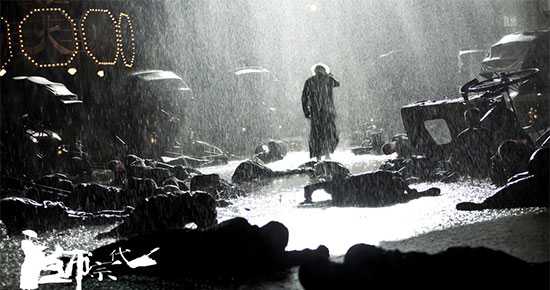
Me getting to the subway station after watching THE GRANDMASTER
Posted in China, review, Hong Kong | Comments Off
Monday, October 24th, 2011
Had tickets to two films at the Hong Kong Asian Film Festival today, but I decided to push back THE RAID to watch the 10th anniversary digital remastered version of Pang Ho-Cheung’s YOU SHOOT I SHOOT instead. So, this is the only film watched on Day 6:
Himizu (2011, Japan, Dir: Sion Sono)
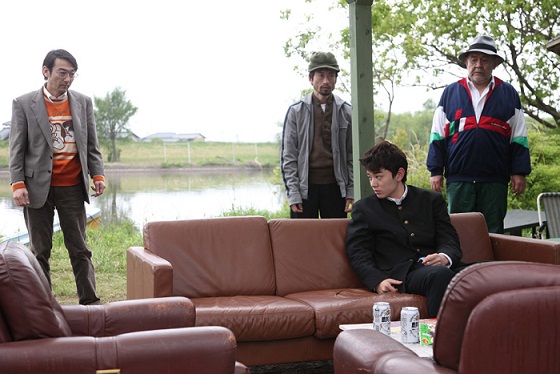
In the middle of the screening, I had to take a bathroom break and missed about 5 minutes of the film. However, I’m actually thankful that I had to take the break, because watching the film in one sitting is an extremely draining experience. From the extreme displays of emotions to the bombastic sound design, Sion Sono takes everything to the extreme in this drama about two tortured youths in post-earthquake Japan. At 129 minutes, HIMIZU is never boring, and it’s often compelling. However, it also feels like it’s about three hours long.
With that said, you’ll either be totally immersed into Sono’s storytelling style or feel completely alienated. I was the former, absorbed from the very first shot of the film, which shows lone figures wandering in the midst of the destruction caused by the earthquake and tsunami that destroyed a good part of northeastern Japan in March 2011. Many will be disturbed by the amount of smacking the lead actors take throughout the film, and you will have to be in tune with Sono’s very dark sense of humor to ride along with it as well. Those who do will be rewarded by this bleak, but engaging coming-of-age tale.
It’ll be interesting to see how Japanese audiences respond to the film come January, as it deals directly with how Japanese people are coming to grips (or not) with the devastating disasters. Some will be disgusted by how Sono portrays Japanese society, and some may admire him for the absurd, over-the-top social critique. Either way, it shows that just because Sion Sono is adapting existing work for the first time, he hasn’t lost his edge as a rebel working in the Japanese film industry. A brave piece of work, but I wouldn’t blame you if you have to wait for video.
Skipping two days due to a detour to the China Film Panorama and a night of rest. But next time: A tattooed assassin and a Taiwanese gymnast.
Posted in festivals, review, Japan | No Comments »
Monday, October 24th, 2011
I originally had three films scheduled for today: India’s THE KITE, plus the two I watched. However, an eye exam (plus the subsequent visit to the optical store) caused me to miss the film. So, day five featured only two films, both from Japan:
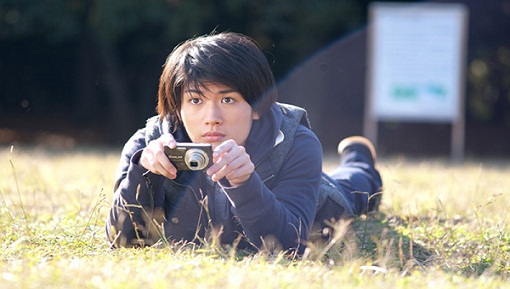
Tokyo Koen (2011, Japan, Dir: Shinji Aoyama)
I have three cities around the world that I consider home: Hong Kong, San Francisco, and Tokyo. As a result, I tend to be easier on films that can represent these three cities well. That may be why I found the latest Shinji Aoyama film to be more engaging that i had expected it to be. On the surface, the lighthearted drama is about the three women in the life of an aspiring photographer. However, in Aoyama’s hands, TOKYO KOEN breaks through simple Japanese indie aesthetics with its picturesque journey through Tokyo’s parks and an odd sense of humor that only Aoyama can pull off.
While Nana Eikura plays the impossibly cute, perky film buff (LIPSTICK reference!), it’s Manami Konishi that surprised me as the hero’s step-sister. Usually playing withdrawn, quiet characters, Konishi exudes a sexy, seductive vibe that I’d never seen before from her. The film’s too light to attract any attention for her performance, but TOKYO KOEN may be my favorite Konishi performance yet.
On a more personal note, the film has also inspired me to take a journey of my own on my next trip to Tokyo. While going around all of Tokyo’s parks may be a bit much, it would be nice to see parts of the city I’ve never been to. Aoyama’s version of Tokyo is one that overseas viewers rarely see - one with little sense of urbanization and technology (the hero insists on using an old film camera). Tokyo’s parks is as big a character as the four human characters in the film, and I would argue that it’s the most beautiful one.

Karate Robo-Zaborgar (2011, Japan, Dir: Noboru Iguchi)
Nikkatsu’s Sushi Typhoon has mostly been specializing in exporting blood, guts, and projectiles shooting from human bodies from Japan to the world - which means they’ve pretty much been making films for foreigners. However, KARATE ROBO-ZABORGAR finally feels like a Sushi Typhoon film for the Japanese audience, even if it’s a very small amount that can appreciate modern throwbacks to cheesy 70’s superhero shows.
The best way I can describe KARATE ROBO-ZABORGAR is a low-budget version of YATTERMAN - a live-action fantasy superhero adaptation that both recreates and parodies its genre. If you look for video of the original ZABORGAR show (or just watch the credits), you’ll see how hard director Noboru Iguchi (MACHINE GIRL) worked to get the film right. However, when he gets to the second half of the film, which jumps 25 years to present day, into the portion of the story not based on the original show, Noboru struggles to keep the energy up as it starts to overstay its welcome.
Still, KARATE ROBO-ZABORGAR is great, irreverent fun at the movies, except when Noboru had to do his Sushi Typhoon duty by throwing in girls in bikinis, blood spraying, and projectiles shooting out of strange places. The rest of the film is so inspired as parody that I wish it left the Sushi Typhoon label so it wouldn’t have had to give any fan service. But I suppose the film wouldn’t have been made without Sushi Typhoon, so KARATE ROBO-ZABORGAR is what it is.
Tomorrow: Sion Sono looks at post-earthquake Japan.
Posted in festivals, review, Japan | No Comments »
Saturday, October 22nd, 2011
I didn’t actually attend any screenings on night four of the 2011 Hong Kong Asian Film Festival. However, I did pop in my 2010 Fresh Wave DVD for a short film that did screen at the festival that night:

The Decisive Moment (2010, Hong Kong, Dir: Wong Wai Kit)
FULL DISCLOSURE: I was an assistant director on a film that competed alongside this film at the 2010 Fresh Wave Festival.
The winner of Best Cinematography at the open competition section of the 2010 Fresh Wave Film Festival (independent short films funded by the HK Art Development Council) has more than just good cinematography going for it. After opening with a shocker of a sequence, the mockumentary-style drama tells the story of a young news photographer who has to team up with a veteran photographer traumatized by a past event. Wong Wai-Kit’s script carries plenty on its plate, dealing with the bond between the old and the young, the old photographer’s guilt, and even a small course on journalism ethics. In fact, it has so much on in its 35-minute running time that the film felt like a digest of a better feature-length film. The bond isn’t as affecting as it should’ve been, and a deeper insight into commercial interest vs. professional ethics would’ve benefited the film greatly.
Nevertheless, what’s here is very impressive for a Hong Kong independent film. The cinematography award is well-earned thanks to the advent of DSLR, and it is a very compelling film for anyone with a remote interest in the media. The acting in the “documentary” sections isn’t natural enough to make it convincing, which means it might’ve been better if it was just chucked out, but the two leads are actually quite good.
The Fresh Wave Film Festival is an emerging organization of the Hong Kong film industry worth looking at. In a world where Hong Kong commercial filmmakers are constrained by Chinese censorship, Fresh Wave gives aspiring filmmakers in Hong Kong the chance to express themselves without fear of censorship by directly funding their films. Many of the young filmmakers at the festival even take the opportunity to explore social and political issues that are too sensitive or too uncommercial for mainstream cinema. Festival head Johnnie To has even reportedly recruited festival contestants to work at Milkyway. While the quality of the films are hit-and-miss, THE DECISIVE MOMENT (as well as Grand Prize winner/indie breakout 1+1) is definitely one worth checking out.
Also screening along with THE DECISIVE MOMENT in the same program is:

Devil Nail Clippers (2010, China, Dir: Jimmy Wan/Derek Tsang)
DEVIL NAIL CLIPPERS is actually the first film of Pang Ho-Cheung’s “4+1″ project, which involves four short films (produced by Pang) and one feature-length film. The four short films - invested by Samsung and Sina (watch for the shameless product placements!) - are available online for free, which is why I already saw the film earlier in the year. Like the print at the HKAFF, the internet version only has Chinese subtitles.
While the basic premise is based on an installment in Pang’s TRIVIAL MATTERS short story anthology, the short story simply makes up the opening scene of the film, about a girl (Zhou Xun) confessing to her boyfriend (Lawrence Chou) that she’s “nail clipper demon”, which means she only eats nail clippers (NOT nail clippings) to stay alive. What follows is a dry-as-sandpaper dark comedy with a devilish twist that kicks off second half of the 45-minute short film.
Since this is an internet-based short film, I assume that Pang and co. are able to go around stringent Mainland censorship (correct me if I’m wrong). While DEVIL NAIL CLIPPER doesn’t have much objectionable content, it is a surprisingly cynical little film that would not have made it through SARFT. Like Wan and Tsang’s LOVER’S DISCOURSE, DEVIL NAIL CLIPPER is not for everyone, but those who enjoy’s Pang’s sly sense of humor should find something rewarding here.
You can watch DEVIL NAIL CLIPPER (in two parts) -and other 4+1 Project films - here. DEVIL NAIL CLIPPERS already has 10 million views. Yes, it’s perfectly legal.
Coming up on day 5: A park in Tokyo, and a robot that does karate.
Posted in festivals, China, review, Hong Kong | No Comments »
Saturday, October 22nd, 2011
This is the quiet beginning before HKAFF goes into full swing, so only one film once again today:
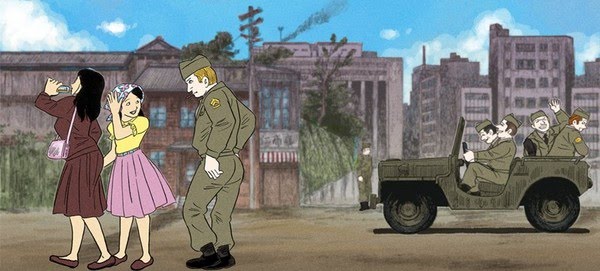
Tatsumi (Singapore, 2011, Dir: Eric Khoo)
Singaporean director Eric Khoo pays a sentimental tribute to Japanese comic artist Yoshihiro Tatsumi, who led the way for adult-oriented comics, or “gekiga”. In addition to adapting his autobiographical graphic novel DRIFTING LIFE, TATSUMI also adapts five of the artist’s short stories. Some of them - the twisted noir piece HELL and the darkly comedic JUST A MAN - are delightfully twisted works filled with haunting imagery. However, some jarring editing and a lack of real insight into Tatsumi’s storytelling style make this sentimental tribute just a tribute more than a real attempt to understand the artist.
TATSUMI is clearly made by a fan, an admirer who doesn’t dare deviate much from what he loves about his idol. I came out having a generally positive impression of Tatsumi’s works, but I’m not sure if the film compelled me to look for more of them. Without that real insight into Tatsumi’s world (his life story - as narrated by Tatsumi himself - is straightforward with just one moment of the surrealism one would see in his work), TATSUMI is a sometimes beautiful piece of work that some may find difficult to connect to emotionally.
Tomorrow: DECISIVE MOMENT, and bonus track: DEVIL NAIL CLIPPER
Posted in festivals, review | No Comments »
Thursday, October 20th, 2011
Day 2 at the 2011 Hong Kong Asian Film Festival featured only one film:

Cut (2011, Japan, Dir: Amir Naderi)
With Japanese filmmakers like Shinji Aoyama and Kiyoshi Kurosawa attached, CUT fortunately doesn’t fall into the foreign filmmaker in Japan syndrome that sees directors misrepresenting Japan and its cultura. Instead, CUT sees Naderi flaunting his love for the art of cinema via an obsessed cinephile who spends his days screaming about the nature of “pure cinema” and holding rooftop screenings of classic films. Forced to take on the 12 million yen debt his yakuza brother left behind, the cinephile becomes a human punching bag for yakuza thugs for money with the help of a bar girl and an elder gang member.
There’s little doubt that those who aren’t arthouse film buffs will find CUT wildly self-indulgent. The abuse the man takes can be an allegory for the indignation passionate filmmakers take for the sake of their art, but even those that understand that metaphor will find it difficult to identify with Naderi’s manic cinema addiction. Essentially, this is the kind of film that an arrogant film school student might make given the resources Naderi has.
In addition to its artistic ambitions, CUT also suffers from a loose narrative that becomes redundant after the intriguing 45-minute setup. At 132 minutes, CUT doesn’t do enough with its central idea to earn the running time, making it a bit of a slog to sit through. It’s not a particularly violent film (lots of punches and lots of bruises, but very little blood), but seeing star Hidetoshi Nijishima getting punched repeatedly for an hour and a half can get a little uncomfortable to watch.
With that said, CUT is sometimes involving, and cinephiles (especially film school graduates) will identify with its obsession with its love of cinema. However, it still suffers from the problem that films about filmmakers suffer from: It assumes that the plight of a filmmaker is interesting even to those not interested in films.
It isn’t, and I’m a film school graduate.
Day 3: Tatsumi.
Posted in festivals, review, Japan | No Comments »
Saturday, September 3rd, 2011
(Note: This entry was edited on September 4th to fix a link. Also added one small paragraph about SEEDIQ BALE and an additional line about Zhao Baohua and the rating system)
- In the entertainment industry, you should always watch what you say publicly, especially when it might offend the powers that be. Of course, when you become one of those people, you can say whatever the hell you want, as long as it doesn’t offend the people above you.
Feng Xiaogang is one of those people. China’s most commercially successful director and a Huayi Brothers shareholder, Feng Xiaogang has always been an outspoken man, and this time, he is taking on China’s State Administration of Radio, Film, and Television
(Note: The following report is sourced and translated from multiple articles, which you will be able to find at the bottom of the entry. Yes, you will have to read Chinese to know which is which)
Remember when I blogged before about how many people get a share of total box office gross in China? I wrote that it is split (never evenly) amongst cinemas, distributors, and investors. However, what I didn’t know was that the SARFT takes 5% from the theatrical gross of any film that is publicly exhibited in China, in addition to the 3.3% revenue tax. The 5%, which goes to a government film fund that aims to help build film screening infrastructure in rural areas, fund children’s films, and fund “Main Melody Films” (I’m gonna have to start a glossary for these terms soon).
At least that’s what they say the fund does. Anyway, Feng, who is a member of the Chinese People’s Political Consultative Conference, recently attended a conference on the Chinese cultural industry and spoke about problems in the Chinese film industry. One of the problems, he said, is the way the film fund makes money.
He used the example of Huayi Brothers. The box office revenue for their films in 2010 was 1.7 billion yuan. After taking away the cinema’s share, money spent on promotion, production, taxes and various fees, the company made a profit of 80 million yuan. On the other hand, the film fund collected 40 million yuan from Huayi, which is already half their profit. Huayi is one of the most profitable film companies in China, so imagine how much this 5% hurts the smaller companies.
To help production companies and investors find an easier way to profitability, Feng suggests that the government should be paying for the work of the film fund, and SARFT should abolish the 5% tax. Yes, he went there.
And he didn’t just stop there, either.
Feng then went on to criticize the SARFT’s censorship process. Essentially, what he says is that the censroship process has come under heavy scrutiny by the audience, to the point where “SARFT examines films, while the people examines SARFT”. He also points out that the pressure from SARFT’s censorship ends up on the filmmakers, as the suggestions for cuts have reached the point of becoming laughable. Also, the audiences ends up blaming the flaws caused by these censorship cuts on the filmmakers.
Feng said even his AFTERSHOCK, which underwent changes from censorship, was heavily criticized for things that were ordered to be there due to SARFT censorship. In such an environment, directors have all flocked to historical films in order to avoid censorship troubles. As a result, Feng noted that there has only been a few “game changer” films in the Chinese film industry. As a result, he requested that the SARFT examines the negative effects of film censorship.
And then came the responses.
A representative for the film fund defends its tax, saying that 1) The film fund is designed to improve the Chinese film industry, and 2) This is a practice that has been done around the world, including France and Korea. In fact, according to the rep, some countries take even more than 5%! In other words,we do what we’re supposed to do, and it’s OK for us to do it because foreigners do it, too!
Still, the most useful thing this spokesman said was the five main functions of the film fund: 1) To renovate old cinemas, 2) Assist in the construction of cinemas, 3) Install digital projection in cinemas across the country, 4) Screen films in rural areas, and 5) “prepare for new technology in cinemas”.
Meanwhile, industry people like Huayi’s head Wang Zhonglei and Starlight’s Song Guangchang are naturally for abolishing the tax. Meanwhile, others have included alternatives like waiving the tax for films that cost less than 10 million yuan, or waiving the tax for Chinese made films and collect only from imported films. Good luck making that latter one work for co-productions.
As for the censorship comment, the head of LeTV suggests being more lenient on cuts for mid-to-low-budget films to “encourage creativity and explore unique topics”. On the other hand, director Fei Xing (of THE MAN BEHIND THE COURTYARD HOUSE) recounted the four months he dealt with censorship and ended up hearing audience criticized him for awkward SARFT cuts. He suggests that the censors should skew younger and take part in more communication with filmmakers.
Film critic/scriptwriter/SARFT censor Zhao Baohua defended SARFT’s work (though he insisted he does not speak for SARFT, but only for himself), saying that films are only undergoing “bottom-line examination”, meaning that as long as the film’s content don’t violate any laws, it will pass. As for films with sensitive topics and violence, SARFT will give their “suggestions” as a responsibility to film fans and the Chinese film industry.
Zhao said that the media is currently demonizing SARFT and the censorship committee for their work, because the films SARFT has halted productions on are bad films anyway. “When a film deviates from mainstream societal values and the market, the fault should not go to the censorship process. Instead, they [the filmmakers] should examine what went wrong with the film,” said the censor. He also felt that China is not ready for a rating system because it would mean that deviant category III films filled with violence and sex would make its way into Chinese cinemas. He even compared category III films to opium, saying “How can opium enter the market? That is absolutely unacceptable.”
Of course, being the SARFT, that fund is not likely to go anywhere, and censorship will be just as heavy, even if there’s a rating system. The government is intent of maintaining its authority over people, and it’s not about to lose the film industry’s influence over people for petty things like artistic integrity. Then again, maybe I’m just pessimistic like that.
- In other news of directors speaking out, Gordon Chan recently expressed his own concerns about the Chinese film industry at a recent event for his latest film MURAL. Chan was asked whether his film is truly worth watching, or is it just another bad film trying to force its way into cinemas to cash in on the emerging industry. He admits that there are many films with a higher budget for promotion than production to hype the film to death, only to disappoint audiences in the end. This is why he vows not to play that kind of game for MURAL. Yes, it’s quite obvious that Chan never played that game, especially since the production budget for KING OF FIGHTERS couldn’t possibly go any lower.
Anyway, the rest of is promotional fodder, so we’ll just skip all that.
- The 150-minute international version of Wei Te-Sheng’s SEEDIQ BALE (referred to as a “Chinese language film” in most mainstream Mainland Chinese media, by the way, without any regional label, despite what some western media say) had its world premiere at the Venice Film Festival, and review has been fairly mixed. Two Chinese-language review pretty agree that while its budget is clearly on the screen, the film in its current form lacks something to earn its “epic” label. One review even call it a live-action attempt at AVATAR (though Wei began developing the project long before anyone knew what AVATAR was).
Meanwhile, reviews on Variety, Hollywood Reporter, and Film Business Asia are also mixed, pointing the film’s violent and bombastic nature.
So SEEDIQ BALE may not be very good, at least in the form of a 150-minute film. But how is the media in Taiwan, where the film may become a game changer for its commercial film industry, reacting to all of this?
The Liberty Times and Yahoo News are focusing on the positive, reporting that the film was well-received at the festival screening with a 10-minute standing ovation, and that the producer proclaimed the price for North American rights immediately went up after the screening. They also reported the full, 4.5 hour version has been screened for the Taiwanese media, and that version was also very well-received, with applause heard at the very end of part two.
Meanwhile, Christian alternative media Awakening News Network and NOWNews reported that the film wasn’t well-received at the festival screening, and that applause was very scattered, as opposed to the 10-minute standing ovation many Taiwanese media reported.
It would appear that SEEDIQ BALE is being used as Taiwan’s own propaganda tool, promoted as the pride of the nation with a film industry trying to pick itself up from its previous failures. Is it great that SEEDIQ BALE can revive the Taiwanese film industry? Of course. It’d just be great if those news were true.
While one news report point out that 140,000 pre-sale tickets (amounting to a NT$40 million gross) has already been sold, film producer Lorna Tee told me on Twitter that the film is being opened on less screens than YOU ARE THE APPLE OF MY EYE and MONGA opened with. Meanwhile, a blog of someone who works in the Taiwanese film industry reports that the women seem to have no interest in the film. Considering Taiwanese blockbusters in recent years (APPLE, CAPE NO. 7, NIGHT MARKET HERO, and even the pretty boys-filled MONGA) all had to appeal to mainstream Taiwanese culture, and in a way, the female audience, a film about aborigines in what is essentially a foreign language filled with war, death, and destruction may not have the wide appeal it needs to become a hit.
Of course, with somewhat lowered expectations, the positive (and possibly inaccurate) news reports can simply be a last-ditch effort by producers to drum up hype for the film ahead of its opening. China does this all the time, to the point of planting stories in the media via underpaid journalists.
Part one of SEEDIQ BALE opens in Taiwan on September 9th. We’ll know what happens then.
- The excellent Hong Kong Film blog paid a set visit to the Patrick Kong-Wong Jing horror double feature HONG KONG GHOST STORIES recently, and the report revealed that the film will feature Chrissie Chau, Him Law, Bau Hei Jing, Juno Leung, and pretty much everyone else who was in Kong’s MARRIAGE WITH A LIAR. The film will feature two 45-minute horror films - one by Wong Jing and one by Kong - and it’ll be opening in Hong Kong around Halloween. I don’t imagine it’ll play in China, though. And if it does…well, we know what films about ghosts made for China are like.
- It’s not over yet. China is still rolling out some more propaganda films to celebrate the Chinese Communist Party’s 90th anniversary, and the latest one is TONG DAO ZHUAN BING. This one has attracted some attention because there have been reports that pointed out part of the cast is made of real-life government officials, which means the attention on the internet is mostly negative.
The film finally opened on August 30th, and a report on Sina Entertainment found that no one is watching the film. The reporter found that the film is being placed in early morning or late night shows in cinemas, and that some shows are even being cancelled due to low admissions. This means it’ll probably beat THE SMURFS this weekend at the box office.
When asked about how the film will make its 8 million yuan budget back, director Zhao Qi insisted that the film will ultimately succeed on word-of-mouth, and that the film essentially needs only 1000-2000 admissions per city to break even. He has also denied that the film features any government officials as actors, insisting that everyone in the film are professional actors.
- Under I read Weibo so you don’t have to news, legendary actress Brigitte Lin has joined both Tencent and Sina Weibo (I only use Sina). In one day, Lin has already attracted over 320,000 followers on her Sina Weibo. You can follow her here.
Next time: The Golden Rock at the 2011 Hong Kong Summer International Film Festival.
Sources
Awakening News Network
Cinephilia 1
Cinephilia 2
Hong Kong Film blog
The Liberty Times
Mtime 1
Mtime 2
Mtime 3
Mtime 4
Mtime 5
Mtime 6
Now News
Radio Taiwan International
Sina 1
Sina 2
Yahoo Taiwan
Posted in festivals, gossip, media, taiwan, China, Hong Kong, news, review, box office | No Comments »
Wednesday, July 6th, 2011
No, this entry is not going to be purely on the communist propaganda flick. The title actually refers to the revival of this blog. The Golden Rock has been away for a while due to various issues (mainly time-related) and the shift to Twitter. For that I can only offer an apology to Boss Kozo and people who read on a regular basis, and I hope that this revival will last more than a few entries.
With that, the blog will not be updated on a daily basis. I will be tightening the focus back to Hong Kong and China, since there’s already plenty of news to cover in these two regions. Rather than line-by-line links, the blog entries will be more focused on analysis of each story. You will see that new format below.
As always, there will be no gossip, because whether Lucas Tse is changing his last name is none of my concern, and it probably isn’t yours, either (unless you’re a member of the family or Lucas’ school). On the other hand, if Cecilia Cheung causes production on THE LION ROARS 2 to stop because of her divorce, then it’ll be covered here.
For broader coverage of Asian cinema, please visit Film Business Asia. They are where I go to most for English-language Asian cinema coverage, and I recommend all to do the same.
So here we go:
- First story today is on Jacob Cheung’s REST ON YOUR SHOULDER. The Chinese media has been covering this film intensely ever since its premiere at the Shanghai Film Festival (it played in competition). It’s hard to dig through all the rumors and speculation, but here are what appear to have happened:
Cheung’s investors have spent RMB 60-70 million (a fairly high budget for its genre) on a special effects-filled fantasy starring Aloys Chen, Guey Lun Mei, and Gigi Leung. However, Cheung’s absence at the festival screening has sparked rumors that Cheung is perhaps not happy with how the film is being presented. Also, the distributor took many steps, including heavy security and playing it at a small auditorium, to make sure the film is not shown to a large audience, which also points to possible nervousness on the part of the distributors that the film isn’t very good.
At the festival, the head of the production company stated to the press that the theatrical version of the film will be cut to 90 minutes (from 120), which further fueled the “Cheung not happy” rumors. Two weeks ago, the production company gave in and said that the full 120-minute cut will be the theatrical version (especially ironic, given Derek Elley’s review).
Just when things seem to be settling, Cheung wrote on his Sina Weibo this past weekend that he has been waiting in Beijing to be contacted about promotion for the film, but no one has asked him to do so. It’s even messier because the production company has canceled promotional events with “talent unavailability” as an excuse (after Chen and Guey publicly stated they are fully behind the film). Now the talk is that the production company are simply giving up for some reason. Meanwhile, Cheung has taken to Weibo to promote the film on his own, with Charlie Yeung and other celebrities passing the word. The distributor has been contacted, and they said they are shocked by Cheung’s weibo entry. They also pointed out that the stars are all currently tied up on other projects (Aloys on PAINTED SKIN 2, Jian Yi Yan is doing a play, and the others as well).
Opening just four days after Peter Chan’s WU XIA, what will happen to REST ON YOUR SHOULDER this weekend? I’ll be watching the film this weekend on opening day in Shenzhen, and we’ll know whether Cheung’s efforts worked next week when the box office numbers are out.
Story is mostly from this article (and other articles) at mtime
- Speaking of WU XIA, the film opened on July 4th in China. However, a controversy has already brewed up before the day ended, as netizens uploaded pictures of their handwritten tickets from China’s Jinyi Cinemas chain on Weibo. Those posts were deleted several hours later.
Here’s how it works: You walk up to the box office, and you buy a ticket to WU XIA. However, the theater hands you a ticket to BEGINNING OF THE GREAT REVIVAL instead and writes down your WU XIA showing information by hand. Yes, you can still watch WU XIA with your ticket, but the computer marks down that your money went to BEGINNING OF THE GREAT REVIVAL. This happened reportedly in several cities.
Damage control was quickly initiated, with the cinema chain’s spokesperson explaining that the ticket buyers changed their mind, and their staff hadn’t followed proper procedure by printing new tickets and canceling the other ones. China Film Group denies that they have any hand in it, and WU XIA’s distributors have also said that they’ve spoken to the cinema chain and that the matter is “settled”. WU XIA’s distributor is also now offering a RMB 1,000 reward for any reports of such box office gouging, so if you get a handwritten ticket for WU XIA in China, be sure to send it in to Stellar.
This is not the first time “box office gouging” has happened. Back in December, netizens discovered that people were buying tickets to MY NAME IS NOBODY and ended up getting a printed ticket to SACRIFICE. Netizens are wising up to the practice, and it’s likely this will only be a temporary fad.
- And now, China box office:
As expected, BEGINNING OF THE GREAT REVIVAL led the box office chart again, but the weeklong gross was not as high as I had predicted, given that the party would want to score on the big CCP anniversary. Between June 27th and July 3rd, BEGINNING OF THE GREAT REVIVAL made RMB 92.15 million for a 19-day total of RMB 317.15 million. This is not close to the final gross of FOUNDING OF A REPUBLIC, and nowhere near the 30 million admissions / RMB 800 million gross that China Film Group is targeting.
So, what happened? The film had a significantly reduced number of showings this week (from 88,000 shows to 64,000), and the film faced competition from new entries TREASURE INN (which made an impressive RMB 54.5 million), THE DEVIL INSIDE ME (RMB 8.15 million), and the dubbed French flick COURSIER (RMB 8.1 million), as well as stayovers THE PRETENDING LOVERS (RMB 28.1 million after 10 days), SNOW FLOWER AND SECRET FAN (RMB32.75 million after 10 days), and ANIMALS UNITED (RMB39.95 million after 10 days). KUNG FU PANDA has also now passed the RMB600 million mark.
I had two reactions to this news (in order): Why didn’t the party/China Film Group do something to rig the numbers, and why am I surprised that China Film Group ISN’T rigging the numbers (especially with 80 million communist party members in China alone)? We were so bombarded in foreign media about how hard the party is pushing this film that we’re surprised when they follow the rules, and now the film seems to be performing beneath expectations. Shouldn’t we be ashamed of the assumptions and distrust we’re putting into this system, especially when they’re (appearing to be) proving us wrong?
China Film Group’s response to the current box office performance of BEGINNING OF GREAT REVIVAL? “When there’s a big film, shows will be cut accordingly. Everything will operate as the market dictates.” They have also said they’re ready for the release of TRANSFORMERS 3 on July 21st.
By the way, no one has confirmed there’s a cap that stops all foreign films from being released until REVIVAL hits 800 million. If China Film Group is going ahead with the July 21st release for TRANSFORMERS, then the quote in this New York Times story is wrong. Want to know why I kind of believe CFG? Because they’re distributing TRANSFORMERS, too.
- Short bits of production news:
- Daniel Lee has officially wrapped the shoot for WHITE VENGEANCE, starring Leon Lai, Zhang Hanyu, Anthony Wong, and Jordan Chan. The film will reportedly now aim for a late November release. This now locks down the films coming in the year-end slot: WHITE VENGEANCE, Derek Yee’s THE GREAT MAGICIAN, Zhang Yimou’s HEROES OF NANJING, Tsui Hark’s FLYING SWORDS OF DRAGON GATE, and (supposedly) Wong Kar Wai’s GRANDMASTER. Sure they don’t want to shuffle that a little bit?
- Zhou Dongyu, Richie Ren, Gigi Leung, Aarif Lee, and Teddy Robin will be starring in QIN CHENG ZHI LIAN (no English title yet), a tearjerker directed by Barbara Wong. The film began shooting on July 21st, and it’s aiming to open at the end of December. I’m afraid. Very afraid.
Next time: “How much did they pay them”?! / Stephen Fung starts on Tai Chi / SEX AND ZEN boosts Hong Kong box office in first half of 2011.
Posted in gossip, China, review, box office | No Comments »
Tuesday, January 4th, 2011
As I keep trying to plug the hole that lets the spam come in, there will still be no comments. You can @ me on Twitter and that’ll be a comment. Will be glad to retweet or paste back here on the blog.
- My report on 2010 Chinese box office. There hasn’t been a comprehensive report with these numbers yet, so I crunched the numbers myself based on SARFT’s and entgroup.cn’s numbers. Feel free to refer to them, as they should be pretty close to the official numbers.
A little update: As of January 3rd, LET THE BULLETS FLY has surpassed INCEPTION to become the third highest-grossing film ever released in China with 530 million yuan in the bank.
- Chinese-Korean director Zhang Lu (of DESERT DREAM and IRI) will be getting a retrospective of his work at the Korean Film Archive in March. The venue will also be giving blankets and pillows for those who want to sleep through them.
- The full program hasn’t been announced yet, but the Berlinale has already announced roughly half the films in its Panorama section, and it includes three Korean movies! I can’t wait for them to announce the Generation K-Plus selections to see which Hong Kong movie 14-year-olds will be honoring this year.
- Speaking of being honored, the Korean Times gives an introduction/review to this weekend’s no. 1 Korean film THE LAST GODFATHER. It sounds like the comments section of the trailer is funnier than the movie itself. A sampling:
“As you said, this movie might be a crap movie.
Replace “Korea” and “Koreans” with “China” and “Chinese”, and you wouldn’t be able to tell the difference.
Short entry today. They’ll get longer as I get my groove back.
Posted in China, festivals, review, South Korea, Hong Kong, box office | No Comments »
Monday, January 3rd, 2011
Yes, another year, another New Year’s resolution to keep up the blog. However, I’m taking several measures to make sure my blogging work can run a little more smoothly.
First, all number crunching will be left to my Twitter. Without much time to spend writing an entry everyday, leaving the number crunching out of the entry ensures that I wouldn’t have to stop and do all those calculating. However, I can access my Twitter a lot more often than my blog, so it makes sense for me to do number reporting whenever I can get to the numbers. That hopefully means I will report even more numbers than I already do on Twitter, since right now it’s only covering Hong Kong and Chinese numbers. Do note that I will keep covering any big news regarding box office here.
Second, I have over 40,000 comments sitting there waiting for me to likely mark them as spam. I am literally getting a new spam comment every minute, and I simply cannot check in every hour to get rid of them. So until I can get rid of all of those comments to a size I can work with, I have to close the comments section. I will, however, take any comment on my twitter instead.
And now, on with the news!
- China’s box office grew by an astonishing 61% in 2010, making it now the third largest film market in the world. China expects itself to surpass Japan - 2nd in terms of gross - by 2015. With Japanese gross partly due to high ticket prices, I wouldn’t be surprised if China has already passed Japan in terms of attendance.
- The Kouhaku Uta Gassen, one of Japan’s highest-rated television shows and a cultural institution, scored OK ratings for its 2010 edition.
- Speaking of box office, Hollywood Reporter recaps this year in Bollywood, with some low-budget films scoring surprisingly high grosses.
- Derek Elley of Film Business Asia has one of the first official English-language reviews of LET THE BULLETS FLY. I agree with the assessment.
- Once dubbed the “Golden Manager”, Paco Wong officially leaves Gold Typhoon (previously Gold Label) to pursue other businesses, as well as continuing to develop movies.
Why is this important? Paco Wong resurrected the likes of Leo Ku, helped lift Miriam Yeung to become one of the biggest stars of Hong Kong, and nurtured Stephy Tang to be a star. He nurtured so many award-winning pop stars at one point that every other pop star started their thank-you speech with “thank you, Paco.” Under his reign as artist management, Gold Label became one of Hong Kong’s biggest record labels and eventually churned out successful local films like DRAGON LOADED and the Patrick Kong romance films. They weren’t necessarily good movies, but Gold Label made local films for a local audience, and that makes Paco Wong an important man already.
When Gold Label became Gold Typhoon, managerial restructuring put Paco into executive position and away from artist management. After losing Miriam Yeung and Leo Ku, it became downhill for Gold Typhoon and Paco. The last film Gold Typhoon produced under Paco was LOVE CONNECTED in 2009.
- Was going to report some box office speculation news for China, but it’ll wait until more solid numbers come in from cinema.com.cn
Starting off slow for now, but will slowly get into the groove.
Posted in gossip, India, China, review, Hong Kong, box office | No Comments »
|
|
|
| |
| |
|
|
|
|
|
|
|
|
|
|
|
|
|
|
|
|
|
|
|
|
|
|
|
|
|
|
|
|
|
|
|
|
|
|
|
|
|
|
|
|
|
|
|
|
|
|
|
|
|
|
|
| LoveHKFilm.com
Copyright © 2002-2024 Ross Chen |
|
|











